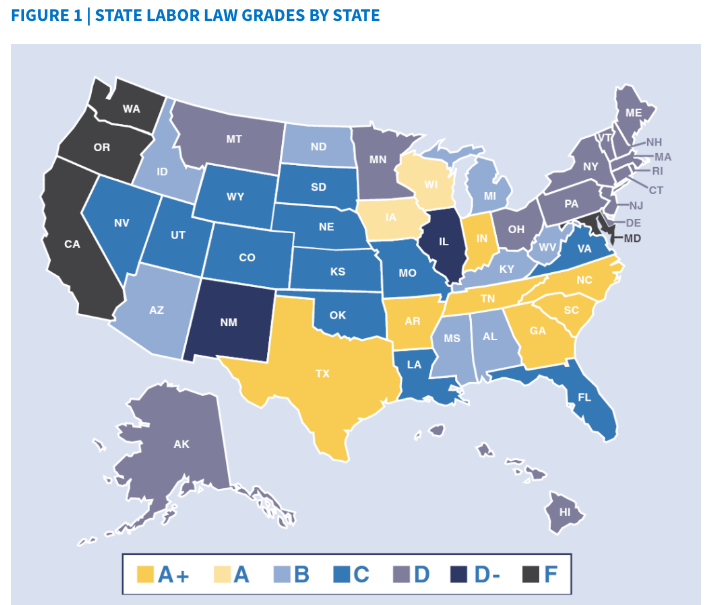Minnesota misses the mark with state labor laws
Minnesota’s state labor policies continue to undermine worker and taxpayer rights, according to a recent report on public-sector labor laws by the Commonwealth Foundation.
The report gave Minnesota a “D” grade due to the state falling short of protecting the rights of individual workers and shielding taxpayers from overspending. The report’s grading system considered state laws, administrative codes, and regulations related to public-sector collective bargaining, thus going beyond simply whether or not a state has right-to-work status.
Here are a few ways Minnesota is missing the mark on labor freedom.
Right-to-work: No.
While Minnesota public employees no longer have to financially support a union in order to keep their jobs, private-sector employees working under an employer-union arrangement do not have that option and are required to pay fees as non-union members. Right-to-work states, of which there are 27 now, protect workers in any employer-union arrangement from being forced to join a union or pay union dues or fees.
Paycheck protection: No.
Government payroll deductions of both union dues and political money for unions are automatic from member paychecks. This puts the cities, counties, and state agencies between a rock and a hard place, as they are forced to collect the dollars on behalf of unions. Union members often have to jump through hoops in order to get the direct political contribution refunded. Paycheck protection prohibits the deductions of political money for unions and “exists in full when government agencies are prohibited from collecting both union dues and political contributions on behalf of unions,” according to the Commonwealth Foundation’s report.
Collective bargaining: Required.
Collective bargaining is required for all government workers in Minnesota. This means that a public-sector employee cannot individually negotiate his or her wages, benefits, etc. The terms negotiated in a union’s collective bargaining agreement with the individual’s employer are what they are for all those represented within the bargaining unit, regardless of membership status. Minnesota labor law also gives unions the right to exclusive representation of workers, which the unions fought for, and is why “freeloader” claims are disingenuous.
Union release time: Yes.
Minnesota public-sector labor law includes provisions permitting union release time. This expensive union privilege “releases” an employee “from regular job duties to perform labor union business — often while still receiving taxpayer-funded pay and benefits,” according to the Commonwealth Foundation report. “Such union work involves handling grievances, attending union meetings, representation work, and political lobbying.” Basically, union officials receive paid time off from their government jobs to engage in union business during regular work hours. According to the report: “For long-term absences — such as a state teachers’ union president’s absence from the classroom for years — it occurs without loss of benefits or seniority.”
Conclusion: Time to learn from our neighbors.
Minnesota’s neighboring states received higher grades, with Wisconsin and Iowa setting the bar high. Wisconsin’s Act 10, passed under Gov. Scott Walker, remains the gold standard for government union reform and worker freedom, “continuing to yield huge benefits more than [a] decade later,” according to the report’s authors.
From regular union elections, paycheck protection, and tax relief on ordinary citizens to removing the stranglehold of teachers’ unions on education policy, the benefits from Act 10 “serve as a window into the importance of reducing outsized government union influence across the country.”
Four years ago, the U.S. Supreme Court’s ruling in Janus v. AFSCME ended forced unionism for public-sector employees. While that was a big step forward for protecting and expanding employee freedom, work remains. Minnesota policymakers would do well to learn from other states who are making freedom of association a reality for more of their workers.
